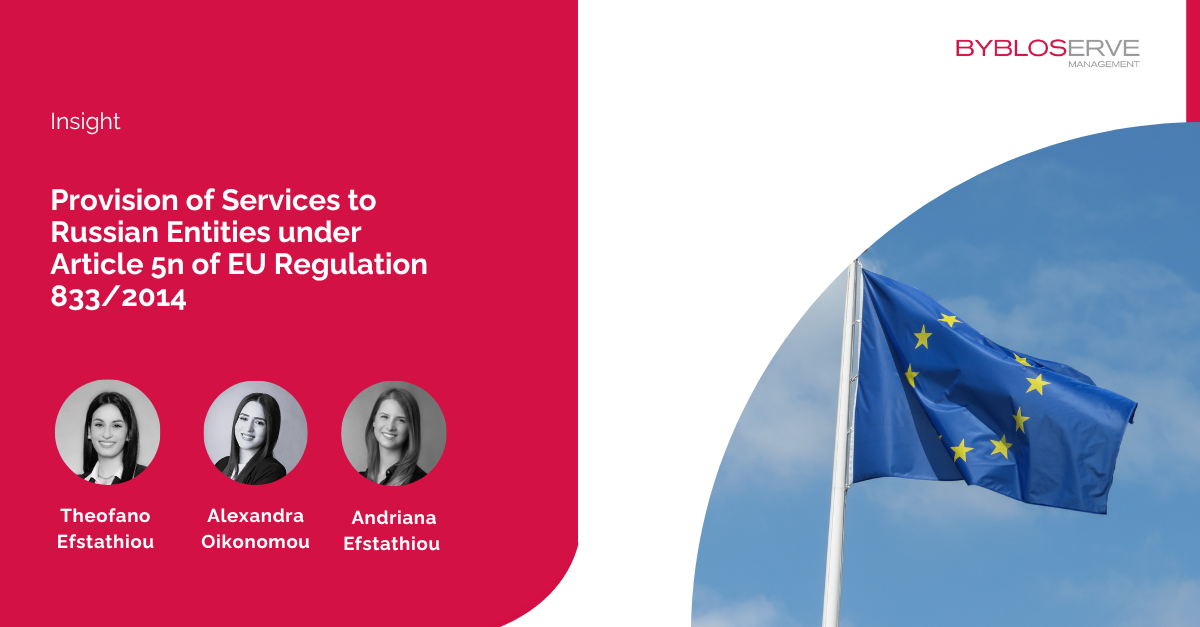
The European Union has adopted restrictive measures against Russia in response to the ongoing geopolitical situation. One of the key provisions, Article 5n of Council Regulation (EU) No. 833/2014, specifically restricts the provision of certain professional services to:
- The Government of Russia; and
- Legal persons, entities or bodies established in Russia.
This newsletter provides a brief overview of the prohibited services, exceptions, and compliance considerations to help businesses and professionals ensure adherence to the regulation.
Main Text:
Prohibited Services under Article 5n
As of 4 June 2022, it is prohibited to provide, directly or indirectly, the following services:
1. Accounting, Auditing, Bookkeeping & Tax Consulting Services
- Recording of commercial transactions.
- Examination of accounting records and financial statements.
- Business tax planning and consulting.
- Preparation of tax documents.
2. Business and Management Consulting Services
- Advisory, guidance, and operational assistance for business policy, strategy, and overall planning.
- Structuring, control, and management auditing of organisations.
- Project management, market management, human resources, and production management consulting.
- Fees and operational support related to overall organisational performance.
3. Public Relations Services
- Advisory and operational services aimed at improving client image and stakeholder relations.
- Lobbying activities are included under public relations services and cover attempts to influence legislation, policy, or public opinion on behalf of Russian entities.
The scope of these services should be interpreted with reference to Annex II to Regulation (EC) No. 184/2005.
Exceptions & Exemptions under Article 5n
Although Article 5n establishes a broad prohibition on providing professional services to the Russian government and Russian-established entities, the regulation also provides for specific exceptions and derogations. These are designed to ensure that essential rights and humanitarian needs are not obstructed.
- Wind-Down of Pre-Existing Contracts
- Services that are strictly necessary to terminate contracts concluded before 4 June 2022 were allowed until 5 July 2022.
- This was a transitional measure to allow businesses to lawfully close existing obligations.
- Legal Proceedings
- Services that are strictly necessary to ensure the right of defence in judicial proceedings or the right to an effective legal remedy are still permitted.
- For example, a Russian entity can engage a law firm in the EU to defend itself in a court case.
- EU-Owned Subsidiaries in Russia
- The prohibition does not apply to services intended for the exclusive use of Russian entities that are owned or solely/jointly controlled by a legal person incorporated under the laws of an EU Member State.
- This ensures EU companies can continue to manage and support their Russian subsidiaries for internal purposes.
- Humanitarian and Civil Society Derogations
- National competent authorities may grant specific authorisations for:
- Humanitarian purposes, such as the delivery of medical supplies, food, humanitarian assistance, or evacuation support.
- Civil society activities, including those that directly promote democracy, human rights, or the rule of law in Russia.
Indirect Provision of Services
Article 5n also prohibits providing services indirectly to Russian entities. This includes cases where services are provided to non-Russian entities, such as subsidiaries, if the services ultimately benefit a parent company established in Russia.
- Services provided in good faith to non-Russian entities for their own purposes are not prohibited, provided they do not circumvent the Regulation.
- Article 12 prohibits knowing or intentional participation in activities designed to evade the restrictions.
Compliance Considerations
- Businesses must carefully assess the ownership and control structure of Russian counterparties before providing any services.
- Engagement with Russian entities may expose firms to legal, reputational, and financial risks if the scope of services falls within the prohibited categories.
- Due diligence and proper record-keeping are essential for demonstrating compliance with Article 5n.
Key Takeaways
- Provision of accounting, auditing, bookkeeping, tax consulting, business/management consulting, or public relations services to Russian government entities or companies established in Russia is prohibited.
- Lobbying activities are included in the scope of prohibited public relations services.
- Exceptions are limited to legal defence, EU-owned subsidiaries, and authorised humanitarian or civil society activities.
- Robust compliance frameworks are essential to mitigate sanctions-related risks.
Compliance Reminder
Given the complexity and evolving nature of EU sanctions, it is essential for businesses and professionals to seek tailored legal advice before engaging in any cross-border services that may involve Russian entities. Proper legal guidance will help ensure that no activity inadvertently breaches Article 5n or related provisions, safeguarding both compliance and reputation.
Ending Sentence:
How Can Bybloserve Management Assist You?
We monitor EU regulatory developments to keep clients informed and compliant. We advise on Article 5n obligations, support enhanced due diligence and risk assessments, review compliance frameworks, and assist with communications and authorisations with regulatory authorities, helping clients minimize legal and reputational risks.
For more information, please send your queries at
info@bybloserve.com